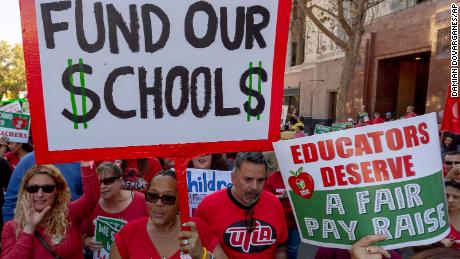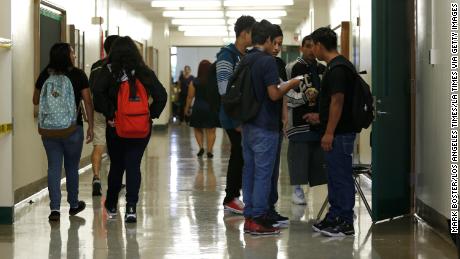(CNN)Under a relentless cold drizzle, 32,000 Los Angeles educators walked off the job Monday in the country's second-biggest school district.
That means about 600,000 kids have no idea when they'll see their teachers again.
Weeks of heated negotiations between the United Teachers Los Angeles union and the Los Angeles Unified School District went nowhere, leading to the city's first teachers' strike in 30 years.
But this strike isn't focused on teachers' salaries.
"It's absolutely not the pay raise. It's about class size reduction. In other words, hire more teachers," said Andrea Cohen, who's taught at John Marshall High School for 24 years.
"We want to have fully staffed schools. That means librarians, nurses, psychiatric social workers and their interns. We have 46, 45, 50 students in a class. It's unacceptable."
Both the union and the school district say they want smaller class sizes, bigger teacher salaries, and more counselors and nurses in the district's roughly 1,000 schools.
The big debate revolves around how to fund them.
While the adults keep struggling to find a resolution, students are still expected to go to school during the strike.
Despite the mass exodus of 32,000 teachers and staff, classes will continue at all schools. LAUSD has hired about 400 substitute teachers and reassigned more than 2,000 administrators to help educate the 600,000 students.
As for how that works out logistically, "It's case by case, school by school," said Shannon Haber, chief communications officer for LAUSD.
The huge shortage of teachers is enough to make Andrew Krowne keep his four LAUSD children home for as long as the strike lasts.
"It's just a sheer overwhelming number of children versus adults," he said. "I'm not risking my children's safety."
Numbers and accusations fly
While both UTLA and LAUSD have made some concessions, both the union and the school district accuse the other of giving misleading facts and figures.
In LAUSD's latest offer to the union Friday, the school district said it "would add nearly 1,200 more educators -- teachers, counselors, nurses and librarians -- in schools, reducing class size in thousands of classrooms."
Class sizes in grades four to six would be limited to 35 students, and class sizes in all middle and high school math and English classes would be limited to 39 students, the school district said.
The offer would also "ensure no increase in any class size, increase nurses, counselors and librarians at all schools, along with a 6% salary increase and back pay for the 2017-2018 school year," LAUSD said.
But union President Alex Caputo-Pearl said the offer was good for only one year and that the school district's proposal was "woefully inadequate."
The union wants LAUSD to pull from its $1.86 billion in reserves to increase school staffing and boost teachers' salaries by 6.5%.
But the school district says it's not nearly as wealthy as the teachers' union suggests.
"School budgets in California are set in three-year increments, and from July 2018 to June 2021, Los Angeles Unified will spend $24 billion educating students. This includes its entire, existing $1.8 billion reserve," LAUSD said.
The school district said at this rate, it might not even have enough money to meet a required 1% reserve by the 2021-2022 school year.
"Our commitment to our families is to make sure all of the money we have is being spent in schools. We are doing that," LAUSD Superintendent Austin Beutner said in a statement.
The financial situation is so bad, the Los Angeles County Office of Education is stepping in. Last week, the state-funded regulatory agency assigned fiscal experts to work with the school district on a plan to "eliminate deficit spending and restore required financial reserve levels."
And the Los Angeles school board has ordered the superintendent to come up with a three-year "enterprise plan" to get more revenue by March 18. That plan "could include parcel tax and school bond measures, as well as strategies for increasing enrollment."
Beutner blamed the union for the stalemate, saying it rejected the school district's latest offer Friday and then "walked away from bargaining."
"We remain committed to resolve the contract negotiations as soon as possible," the superintendent said. "We would encourage them to resume bargaining with us anytime, anywhere, 24/7. We'd like to resolve this."
California Gov. Gavin Newsom urged the two sides to go back to the negotiating table. Newsom said he has submitted a budget "that would make the largest ever investment in K through 12 education, help pay down billions in school district pension debt and provide substantial new funding for special education and early education."
600,000 kids / 2,400 substitutes and administrators = 1 logistical nightmare
The big question for parents during the strike is whether to send their children to school. Many are concerned about so few adults replacing 32,000 missing educators.
LAUSD tried to alleviate concerns, urging parents to "keep kids safe and learning in school." It created a strike hotline for parents and is accommodating special-needs students at early education centers.
But Krowne, the father of four LAUSD students, said he's keeping his kids home -- even though the school district will not excuse students' absences due to the strike.
He said one daughter was instructed to report to the auditorium, then rotate to the lunch area, then to the gymnasium, then to the outdoor field.
"If five teachers showed up, everyone's going to be watching movies in the auditorium," he predicted.
"There's not instruction happening. Why the hell would I send my kids to day care with hundreds and hundreds of kids? My kids would be safer at home with their parents. Frankly, my kids will learn more at home."
But Evelyn Alem├Īn said she's sending her daughter to school, even if she's taught by someone other than her regular teachers. She said any school instruction is better than nothing.
For some other parents "it's a toss-up," Alem├Īn said. "For those parents who have children who have special needs, in special education, they're just not sure if the folks who are taking care of them that day will be able to support the needs of their children."
'Parents are caught in the middle'
While the union and school district are stuck at an impasse, parents are also in a difficult position.
"I feel like parents are caught in the middle of these two big forces that are in charge of looking out for our children," said Alem├Īn, the mother of a 14-year-old high school freshman.
"I think most parents agree with what the teachers are asking for. We definitely want smaller class sizes. We definitely want teachers to be appropriately compensated," she said.
But as far as the strike goes, "I don't agree with the way it's taking place right now."
Krowne disagrees. He said by pulling his kids out of school, he's making a statement in support of the teachers' strike. And if enough parents do the same, it will get the school district's attention.
"My older children understand," he said. "They know what it's like to be in a mixed (grade) class of 36 or 35 students."
Will we see another wave of teacher strikes?
What's happening in Los Angeles resembles the widespread frustration that led to a flurry of teachers' strikes across the country last year.
And while the LA walkout is the first major teachers' strike of 2019, it certainly might not be the last.
"I think what you're seeing is people want to make conditions better for children and for themselves," said Randi Weingarten, president of the American Federation of Teachers.
"People have tried to talk to legislators or talk to their bosses ... they've gotten dismissed or disparaged," she said.
"A strike is not a first resort for anyone. It's a last resort -- especially for teachers who are asked to do more with less every day. And enough is enough."







